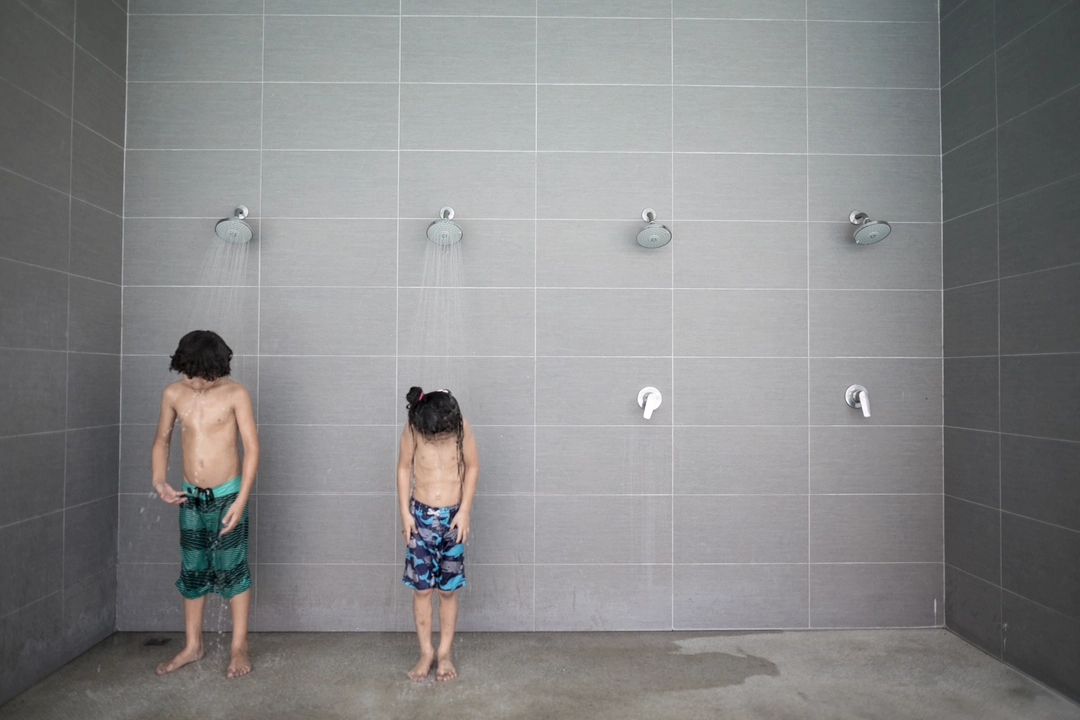Understanding Ringworm: A Brief Overview
Before diving into the main topic of whether you can catch ringworm from swimming pools and public showers, it is essential to understand what ringworm is. Ringworm, contrary to its name, is not caused by a worm but is a fungal infection. The medical term for ringworm is "tinea," and it affects the skin, hair, and nails. The infection appears as a circular rash with a raised, red border, which is why it's called "ringworm."
How Ringworm Spreads: The Basics
Ringworm is a contagious infection that spreads through direct contact with an infected person or animal. It can also be contracted by touching contaminated objects, such as clothing, towels, and bedding. The fungus thrives in warm, moist environments, which makes places like swimming pools, public showers, and locker rooms ideal breeding grounds for it to spread. Now that we have a basic understanding of ringworm and how it spreads, let's explore the risks of contracting it in swimming pools and public showers.
Swimming Pools: A Potential Source of Ringworm
Swimming pools can be a hotspot for various infections, including ringworm. The fungus can survive in the water, especially if the pool is not adequately chlorinated. When an infected person swims in the pool, the fungus can transfer to the water and contaminate it. If you have a cut or abrasion on your skin, it becomes much easier for the fungus to enter your body and cause an infection. Additionally, the wet surfaces around the pool, such as pool decks and changing rooms, can also harbor the fungus, increasing the risk of contracting ringworm.
Public Showers: A Common Ringworm Risk
Public showers, such as those found in gyms, schools, and recreational centers, are another common source of ringworm infections. The warm, moist environment and the high traffic of people create ideal conditions for the fungus to thrive. When an infected person uses the shower, the fungus can spread to the shower floor and walls, where it can easily transfer to other users. Wearing protective footwear, like flip-flops or shower shoes, can help reduce the risk of contracting ringworm in public showers.
Preventing Ringworm Infections in Swimming Pools and Public Showers
Knowing the risks associated with swimming pools and public showers, there are several preventive measures you can take to protect yourself from ringworm infections. Some of these preventive measures include:
- Maintaining proper hygiene: Shower before and after using a swimming pool or public shower, and wash your hands regularly.
- Wear protective footwear: Always wear flip-flops or shower shoes in public showers and pool areas to avoid direct contact with potentially contaminated surfaces.
- Avoid sharing personal items: Do not share towels, clothing, or other personal items with others, as this can spread the infection.
- Inspect pool and shower areas: Check for visible signs of poor maintenance, such as mold, mildew, or dirty surfaces, which may indicate a higher risk of infection.
- Keep cuts and abrasions covered: If you have any open wounds, cover them with a waterproof bandage before entering a swimming pool or public shower.
Treating Ringworm Infections
If you suspect you have contracted ringworm, it is important to seek medical advice as soon as possible. Your healthcare provider will likely prescribe an antifungal medication, either in the form of a cream, ointment, or oral medication. It is crucial to follow the prescribed treatment plan and complete the entire course of medication, even if the symptoms appear to have disappeared. This will ensure that the infection is completely eradicated and reduce the risk of recurrence.
Recognizing the Symptoms of Ringworm
Early detection and treatment of ringworm are essential to prevent the infection from spreading to other areas of your body or to other people. Some common symptoms of ringworm include:
- Red, circular rash with a raised border
- Itching, burning, or stinging sensation at the site of the rash
- Scaly, cracked, or peeling skin
- Discolored, thickened, or brittle nails (if the infection affects the nails)
If you notice any of these symptoms, consult your healthcare provider for an accurate diagnosis and appropriate treatment.
Conclusion: Can You Catch Ringworm from Swimming Pools and Public Showers?
In conclusion, yes, you can catch ringworm from swimming pools and public showers. The warm, moist environments in these places provide ideal conditions for the fungus to thrive and spread. However, by practicing proper hygiene, wearing protective footwear, and taking other preventive measures, you can significantly reduce your risk of contracting this infection. If you suspect you have ringworm, seek medical advice promptly to ensure effective treatment and prevent the infection from spreading.





Anil Karwal
Sounds like a solid reminder-keep an eye on the water quality and always rinse off after a dip.
Suresh Pothuri
The article is mostly accurate, but it omits that proper chlorine levels (< 1 ppm) are insufficient to eradicate dermatophytes; maintaining at least 3 ppm is essential. Additionally, the claim that any wet surface automatically poses a risk neglects the role of sanitation protocols. In India, many public facilities still lack automated monitoring, which exacerbates the problem. Proper maintenance and regular testing are non‑negotiable if we expect safety.
Millsaps Mcquiston
US pools are usually chlorinated, but you can still get ringworm if someone forgets to shower first.
michael klinger
What the article fails to acknowledge is the systematic downplaying of fungal threats by the health industry. The same agencies that promote chlorine tariffs also fund research that minimizes risks, ensuring the public remains uninformed. This orchestrated silence serves corporate profit over personal safety.
Matt Laferty
Let me break this down for anyone who’s still unsure about how ringworm can hitch a ride in public aquatic facilities. First, the fungus responsible for tinea loves warm, moist environments, which is exactly what you find in a chlorinated pool when the chlorine level drops below 2 ppm.
Second, even when chlorine is at the recommended level, it does not instantly kill every fungal spore; some dermatophyte species are remarkably resilient.
Third, the real danger isn’t the water itself but the surrounding surfaces-pool decks, changing room benches, and especially shared towels that stay damp for hours.
Fourth, a tiny cut or abrasion on your skin acts like an open door, allowing the organism to penetrate deeper layers.
Fifth, wearing flip‑flops or shower shoes creates a physical barrier that dramatically cuts down transmission risk.
Sixth, the best preventive habit is to shower both before and after using the pool; pre‑showering removes existing skin debris that could harbor spores.
Seventh, if you notice visible mold, mildew, or a lingering chemical smell, it’s a red flag that maintenance may be lacking.
Eighth, always keep personal items-towels, swim caps, and robes-separate and dry them thoroughly after use.
Ninth, if you do develop a circular, itchy rash, seek medical advice promptly; early antifungal treatment prevents spread.
Tenth, completing the full course of prescribed medication is essential, even if symptoms fade quickly.
Eleventh, educating kids about not sharing towels and washing hands frequently can curb outbreaks in schools and community pools.
Twelfth, remember that the same principles apply to public showers at gyms, schools, and dormitories.
Thirteenth, regular inspection of pool and shower sanitation logs by local health departments helps keep facilities accountable.
Fourteenth, if you own a private pool, test the chlorine and pH levels weekly and shock the water periodically.
Fifteenth, community awareness campaigns that highlight these simple steps have been shown to reduce infection rates by up to 30 % in some municipalities.
Finally, while the risk is real, diligent hygiene and sensible precautions make it a manageable one.
Genie Herron
I feel so gross after swimming I just wanna wash forever
Danielle Spence
Honestly, it’s irresponsible to ignore the simple truth: neglecting basic hygiene in shared spaces is a moral failing. We owe it to each other to keep locker rooms clean and to cover any cuts before diving in. Anything less is just selfish behavior.
Dhanu Sharma
Just saying, a quick rinse before hitting the pool never hurts at all
Edward Webb
When we consider the shared nature of public facilities, it becomes an ethical question as much as a medical one. If one person disregards hygiene, the risk ripples through the community, reminding us that individual actions shape collective health.
Snehal Suhane
Oh great, another article telling us to wear flip‑flops-like we haven’t been doing that since the 90s. Surely the next breakthrough will be sprinklers that sterilize you as you walk out.
Ernie Rogers
Sure, just ignore the chlorine level warnings. It’s not like anyone actually checks the water chemistry anyway.
Eunice Suess
The article is mostly correct but it definately needs a bit more emphasis on covering wounds before diving-otherwise you’re just asking for trouble.
Anoop Choradia
One must also consider the covert agenda behind the widespread promotion of chlorine as a panacea; historical records reveal deliberate suppression of alternative disinfection methods that might actually target dermatophyte spores more effectively.
bhavani pitta
While the prevailing narrative extols the virtues of chlorination, I contend that the very act of over‑reliance on chemicals obscures the nuanced interplay between environmental hygiene and microbial resilience.
Brenda Taylor
Really? Another post about ringworm? 🙄 Might as well tell us the sky is blue.
virginia sancho
Great info! If you’re ever unsure, just remember to shower beforehand and keep your feet covered-simple steps that keep everyone safe.